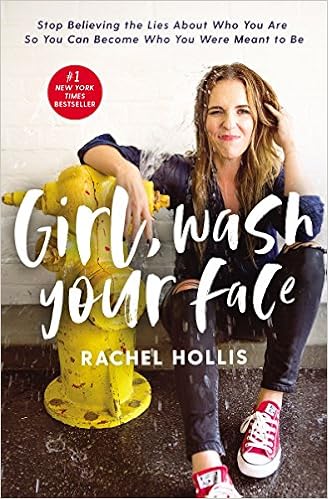I want to be the best version of me I can be. I want to get stronger, listen to more podcasts, read more books, set and meet more goals, grow more spiritually.
 That said, I rarely read self-help books and don’t enjoy listening to motivational speakers. But I was excited when I saw the book Girl, Wash Your Face by Rachel Hollis (Thomas Nelson, 2018). I want women to find their talents, push away lies and excuses and insecurities, and reach their potential. This book has generated buzz for that very reason. Hollis writes about taking responsibility for your life by identifying your beliefs and rising above the lies that hold you back. She provides wisdom and stories from her personal experiences to motivate her readers to be whatever they want to be.
That said, I rarely read self-help books and don’t enjoy listening to motivational speakers. But I was excited when I saw the book Girl, Wash Your Face by Rachel Hollis (Thomas Nelson, 2018). I want women to find their talents, push away lies and excuses and insecurities, and reach their potential. This book has generated buzz for that very reason. Hollis writes about taking responsibility for your life by identifying your beliefs and rising above the lies that hold you back. She provides wisdom and stories from her personal experiences to motivate her readers to be whatever they want to be.
This is well and good. What we must ask, though, is where we should find our motivation for life. What kind of wisdom forms the foundation for our goals? Girl, Wash Your Face contains some truth, but unfortunately, I don’t think that truth is firm enough to create the long-lasting passion for life and self-fulfillment that Hollis models. Rather than review the book, I want to discuss the underlying source of motivation for this book.[1] Hollis is inspiring, but do her advice and suggestions rest on godly wisdom?
Willpower and dreams will only take you so far.
The Source of Inspiration and Motivation
In many ways, the premise of Girl, Wash Your Face is common sense: recognizing some simple truths about life can help you live a better life. Hollis emphasizes taking responsibility for yourself. She says, “You, and only you, are ultimately responsible for who you become and how happy you are” (xi).
Even though this statement is theologically thorny, it is true that people who have an internal locus of control tend to be happier and more successful. If you believe that you have agency, you do more and meet more goals because you (not luck) are responsible for your successes and failures. In the same way, recognizing lies and eliminating negative self-talk can help people strive for good things instead of holding themselves back. Tough love and hard truths are motivating. What happens in life is important—but so is your perception of those events. Girl, Wash Your Face is full of these ideas, and those ideas are not all wrong.
My biggest problem with the book is not with what Hollis says (or at least, not most of it). Rather, what she says isn’t strong enough to spur real life change. Willpower and dreams will only take you so far. In the book, Hollis presents 20 lies she believed and then explains how she overcame those lies. She admits she still struggles, but the book leaves the impression she now has a perfect life. All you must do is do what she did, and you will be set. She only provides her life as an example—if something worked for her, it will work for you, too. This book puts immense pressure on the reader: do more and more and more and don’t quit. In all the encouragement to do and improve, little room is left for contentment and rest in what God has already done for us.
Inspiration from the Word of God
Life experience provides wisdom, especially when that life experience is validated by multiple people. I wish Hollis had provided examples from more women than just herself. Doing so would have strengthened her points and provided more encouragement to her readers that what she is saying is actually possible.
But more than that, I wish she had used Scripture consistently. For the first 10 chapters of the book, the reader would not know this book is supposed to be “Christian.” I am still not actually sure it is supposed to be a Christian book. But in the second half when she referred to Scripture, her statements carried more weight. The truth was sharpened and validated by the Word of God.
Proverbs teaches that “the fear of the LORD is the beginning of wisdom” (1:7). We can use life experience and our gut instinct to try to determine what we should do and how we should live; but the strongest and surest source of truth is God and his Word. We should start with Scripture first to discover the good life and align ourselves with that vision. Scripture guides our path and keeps us from both the sins of idleness and discontentment.
So, when we look at the lie “I Should be Further Along by Now” (chapter 10), we can take comfort in the idea that God called Moses when he was 80 (Exodus 7:7), David began his rule as king at 30 (2 Samuel 5:4), Hannah waited for years to have a child (1 Samuel 1:7), and Abraham and Sarah were 100 and 90 when Isaac was born (Genesis 21:5). The lies “I’m Better Than You” (chapter 4) and “Other People’s Kids Are So Much Cleaner/Better Organized/More Polite” (chapter 11) can be reproved by the truth that none of us is really good enough (Romans 3:11-12) and all our heroes of the faith were terribly flawed. “I Am Defined by My Weight” (chapter 17) falls short when matched against the idea that we are made in the image of God (Genesis 1:26-28) and our value comes from our spirit within, not our physical appearance (1 Samuel 16:7).
Without establishing ourselves and our goals in the Lord, we will come up empty.
Conclusion
Girl, Wash Your Face is not all bad. I did enjoy about half of the chapters, and some were very helpful. But the book is inconsistent. Hollis could do so much more if she gave the book a firmer foundation. Readers should be discerning and recognize that without establishing ourselves and our goals in the Lord, we will come up empty. If we do not start first with what God has already done for us and recognize our contentment and peace come from him, we will never find peace in trying to achieve goals and a good life.
[1] For a review that highlights some of the theological shortcomings of this book, I highly recommend Alisa Childers’s blog post (https://www.alisachilders.com/blog/girl-wash-your-face-what-rachel-hollis-gets-rightand-wrong). She identifies a few of the book’s problems, namely that the author over-emphasizes personal fulfillment, self-love, and materialism at the expense of a sovereign God.




Comments and Pingbacks
2019-03-29 09:22:26
#FaithandCulture Reading: Abuse, Gurus, Infertility, Generosity | Intersect
[…] behind the rise of “gurus” such as Dave Ramsey, Rachel Hollis and Jordan Peterson. Over at Letter and Liturgy, Samuel James offers a thoughtful take on this […]